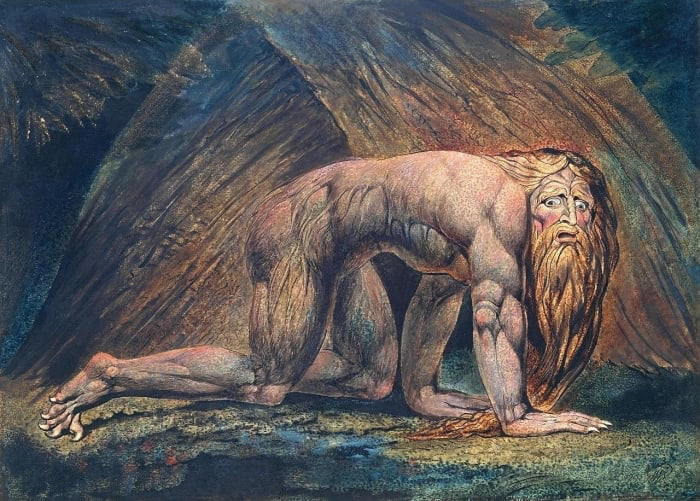Solomon instructs his princely son in Proverbs so that he might complete the mission of dominion given to man; namely, to form and fill the world that God gave to the stewardship of man (see Gen 1.28; Ps 115.16). This will take wisdom, the ability to see how everything should relate, and the skill to put everything in right relationship. This wisdom begins and matures in the fear of Yahweh, loving Yahweh and his discipline and zealously guarding his instruction. As the son submits to Yahweh, the mission will progress; the world will grow and come together to reach its intended purpose. If the son rebels, rejecting the wisdom of the Father, he will reap chaos and destruction, not only for himself but for the world. Adam’s story is a clear picture of this.
The seven-fold structure of the abominations in Proverbs 6.16-19 fit this theme of world-building, echoing the structure of the original week of history. However, Solomon is instructing by the contrary. If you want to know how to de-create the world, then these seven abominations will tell you. These are the sins the son must avoid.
Whether we are talking about an individual’s life or the life of a society, a body-politic, where these seven abominations are present, man, both individual and community, is destroyed along with the world he is called to build.
Solomon paints a vivid picture of the man and his actions. He begins with eyes, moves to the tongue, then to the hands, the heart, the feet, and then back to the mouth. This is a complete corruption of the whole body. At the heart of the structure is the heart itself with its wicked imaginations that is the source of pollution expressed through the eyes, mouth, feet, and hands (Mt 15.19).
The decaying body begins with “proud eyes.” As I have mentioned before, sin is not original. It is a leech that can only live off of draining the life out of something else, a righteous quality. Pride is no different. Sinful pride has a virtuous host: glory. Glory is weight or heaviness that comes with maturity and responsibility, having growing or great amounts of both. God is all-glorious. He is the Weighty One in every respect. Created in his image we are crowned with glory (Ps 8), but being creatures, we are growing in glory, moving from glory to glory (2Cor 3.18). This glory involves maturity that is exalted to be given more responsibility, more rule. There is a healthy independence in this glory, like a man that has grown out of his infancy into mature manhood. He is relatively independent, pulling a significant amount of the load in our collective mission to take dominion of the world. As he proves he can handle the responsibility, he is glorified through exaltation. More rule is given to the man who proves himself faithful in the responsibilities he has been given.
There is nothing wrong with being glorious or desiring glory. You were made for it. Sin is what caused you to fall short of the glory God intended for you (cf. Rom 3.23). We have an appetite for glory because we want to be like God.
Sin distorts this appetite and turns it into pride. Sinful pride exalts oneself and his judgments so that he becomes a rival to God himself, seeking to displace God from his throne. Pride determines for oneself what glory is as well as how and when I should have it. Pride challenges God’s wisdom, believing it can put the world together better than God. Consequently, instead of a healthy independence, pride is sinfully self-sufficient. My glory is not granted in due time by God, but I achieve it apart from the gifts of God. Nebuchadnezzar, king of Babylon, embodies this when he proclaims, Is not this great Babylon, which I have built by my mighty power as a royal residence and for the glory of my majesty?” (Dan 4.30). Pride’s self-sufficiency sees no need for mercy, whether to receive it or give it. Pride is a loner, seeing no need for anyone else … except maybe to use for selfish purposes and dispose of when done.
Pride also is self-exalting. Whether it is the braggart who boasts of things he may or may not have accomplished or the “humble man” who seeks to make others look small through backhanded insults, refusing to accept his creaturely limitations, or being a control freak, pride grasps for glory, impatiently pushing himself forward for more when he hasn’t been patiently faithful in the small things.
Pride cannot complete the mission God gave us because the glory that God promises is granted not grasped. Destruction is the end of pride (Pr 16.18).
The cure for these jaundiced eyes of pride is humility. Humility begins by receiving God’s evaluation about you, the positives and the negatives. You submit to God’s boundaries for your life, willingly and joyfully living within those boundaries whether they are restrictions on your activities or the providence that is making you wait for exaltation. You want the glory that God promises, but you are willing to wait for it because you know it is only legitimate and ultimately life-giving when God bestows it as a gift. In every stage of maturity, humility is grateful, giving thanks to God and others for the mercies that are new day by day. As Jesus told us and lived out the truth that as we humble ourselves before God, he will exalt us in due time (cf. Phil 2.6-11; 1Pt 5.6).














